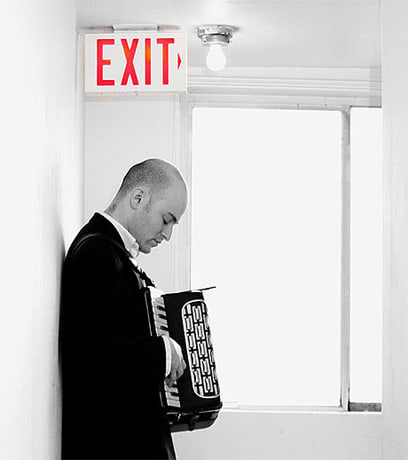After the darkly sardonic The Wedding Dance of the Widow Bride, Vancouver's Geoff Berner does us a mitzvah by throwing more of a party on the celebratory Klezmer Dogs. Closing out a powerful trilogy of recordings with violist Diona Davies and percussionist Wayne Adams, which began with 2005's Whiskey Rabbi, Berner's new record is an improbably giddy exploration of miscegenation. The third chapter begins with "Shut in," a plea to a forlorn soul to shed their agita and embrace revelry. If the song is a coaxing invitation, then "Luck in Exile" clarifies why it's important to "celebrate and grieve simultaneously." As usual, Berner's politics are delivered with a razor-sharp grin on the unusually cheery "Half-German Girlfriend," the achingly beautiful "Play, Gypsy, Play," and a somber take on Kris Demeanor's "One Shoe," a powerful ode to Aboriginal abuse by the Saskatoon Police Department. Berner's careful study of klezmer has yielded a catalogue of near-devotional songs to the music, yet his punk-inspired ambivalence about tradition remains clear on "Authentic Klezmer Wedding Band." As he concludes one approach to his craft, there's no telling what's next for Geoff Berner but it's sure to be singularly provocative.
What's the meaning of Klezmer Mongrels?
Well, it's a pro-mixing album - the mixing of people, drinks, ideas and musical cultures. It's not just klezmer music, which is just my means of exploring the world through my cultural background. It's a Canadian record in a way, a "cultural mosaic." I'm also pleased that we have a man in the White House now who recently described himself as "a mutt"; it feels like we're on top of the zeitgeist.
This record seems shinier, happier.
The whole trilogy is concerned with how to be politically aware and active and also happy at the same time. That's why there are lots of drinking songs on the records and the conclusion really needed to be a celebratory party record that didn't ignore how fucking screwed up everything is but was still able to "rock out."
How is it a trilogy?
I'm on this long journey where I'm deeper into knowledge and understanding of klezmer music and Jewish culture, so there is a sense of closure. I see this as what Churchill called "the end of the beginning." Now that I understand the language, modes and rhythms of klezmer, what am I going to do with it?
(Jericho Beach)What's the meaning of Klezmer Mongrels?
Well, it's a pro-mixing album - the mixing of people, drinks, ideas and musical cultures. It's not just klezmer music, which is just my means of exploring the world through my cultural background. It's a Canadian record in a way, a "cultural mosaic." I'm also pleased that we have a man in the White House now who recently described himself as "a mutt"; it feels like we're on top of the zeitgeist.
This record seems shinier, happier.
The whole trilogy is concerned with how to be politically aware and active and also happy at the same time. That's why there are lots of drinking songs on the records and the conclusion really needed to be a celebratory party record that didn't ignore how fucking screwed up everything is but was still able to "rock out."
How is it a trilogy?
I'm on this long journey where I'm deeper into knowledge and understanding of klezmer music and Jewish culture, so there is a sense of closure. I see this as what Churchill called "the end of the beginning." Now that I understand the language, modes and rhythms of klezmer, what am I going to do with it?
